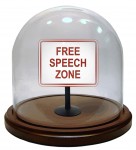 A New Jersey disciplinary rule that prohibits a lawyer from excerpting a court opinion discussing the lawyer’s legal abilities is unconstitutional, says the United States Court of Appeals for the Third Circuit. In Dwyer v. Cappell, the Third Circuit overturned a contrary district court decision (previously discussed here), and held that the disciplinary rule violated the lawyer’s First Amendment right to freedom of commercial speech:
A New Jersey disciplinary rule that prohibits a lawyer from excerpting a court opinion discussing the lawyer’s legal abilities is unconstitutional, says the United States Court of Appeals for the Third Circuit. In Dwyer v. Cappell, the Third Circuit overturned a contrary district court decision (previously discussed here), and held that the disciplinary rule violated the lawyer’s First Amendment right to freedom of commercial speech:
[The provision] effectively rules out the possibility that Dwyer can advertise with even an accurately quoted excerpt of a judicial statement about his abilities. To comply with [the rule], he must advertise with a full-length judicial opinion if he wants to use any portion of that opinion on the website …. However, even on Dwyer’s own website providing a full-text judicial opinion is so cumbersome that it effectively nullifies the advertisement.
In Louisiana, no disciplinary rule expressly prohibits a lawyer from quoting court opinions that discuss the lawyer’s abilities, experience or reputation. However, Louisiana Rule 7.2(c)(1) prohibits a lawyer from publishing an advertisement that is false, misleading, or deceptive, or that fails to disclose material information necessary to prevent the information from being false, misleading, or deceptive. If the rationale of Dwyer v. Cappell is followed in the Fifth Circuit, a Louisiana lawyer could advertise with excerpted court opinions that discuss the lawyer’s abilities—as long as the lawyer’s advertisement is not otherwise false, misleading or deceptive.
